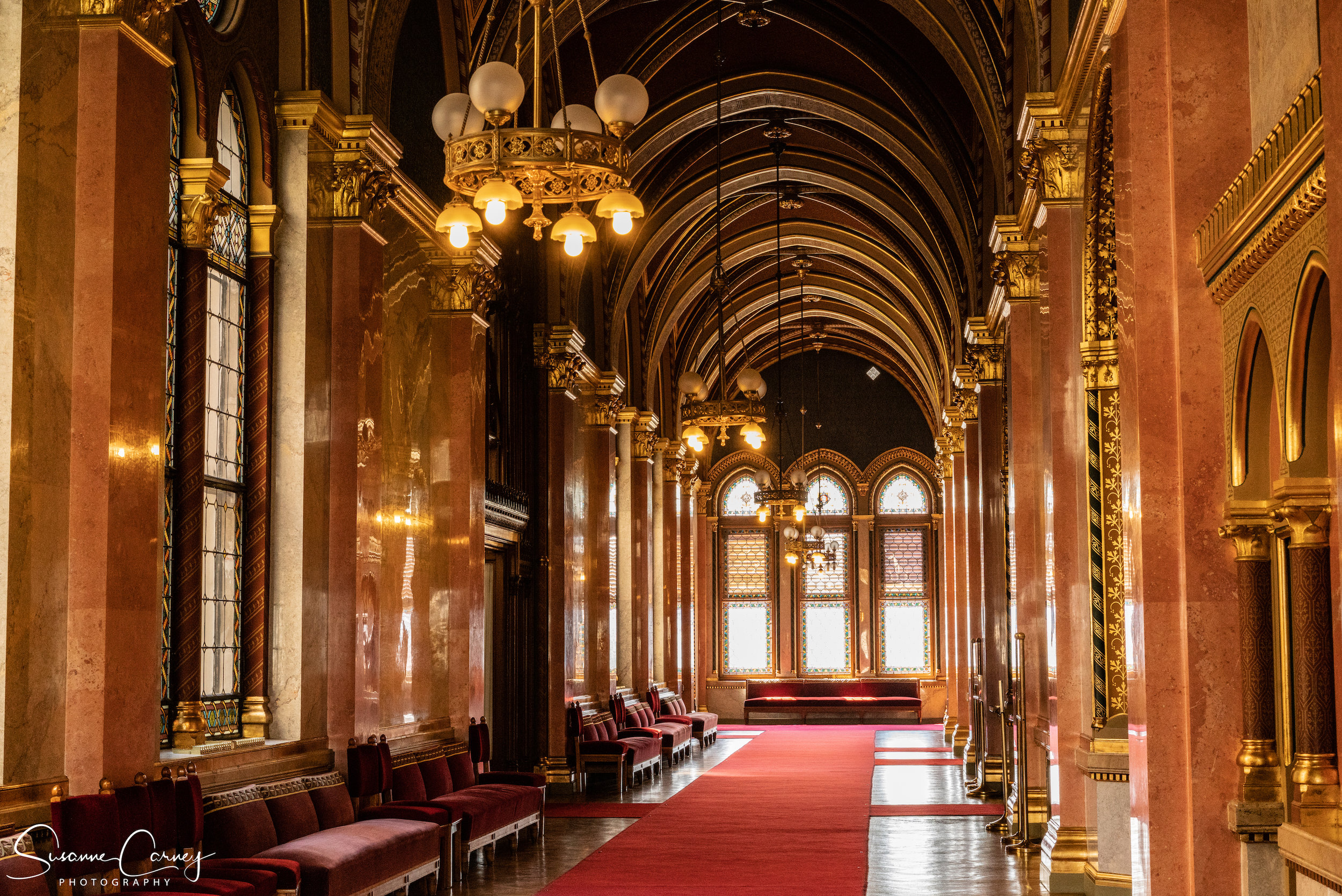Budapest, a Melding of Contrasts: Part 2
Spending time in Old Buda with it's castle, church, and history is a good way to start your tour. Castle Hill provides a literal overview of Danube and the city. This 10th largest city in Europe deserves a closer look however.
Corridor inside the Hungarian Parliament.
Grand staircase inside Hungarian Parliament
Just across the river is that beautiful building seen on numerous river cruise ads. It is one of the most photographed buildings in the world, the Hungarian Parliament on the Danube River. It is huge, the 3rd largest Parliament in the world, and ornate, just like in the pictures. Opened in 1902, it is modeled after London's British Parliament. The inside is full of Hungarian artistry and craftsmanship. You can visit only with a guided tour. Book a tour through several tourist agencies or through the Parliament Visitor Centre. It is as magnificent inside as outside, filled with beautifully carved wood, gilding, stained glass and rich velvet. I highly recommend a visit. You will see a beautiful building and learn about the complex Hungarian history of the 20th century.
Sunlight projecting through "1956" Hungarian revolution monument.
Outside Parliament in the square is a visually clever sculpture. It allows sunlight to project the year "1956" onto the stone pavement. This holds great significance for Hungarians and the free world. On October 23, 1956, a revolution, led by Hungarian students commenced outside the Parliament. It lasted only a few days, until it was quelled by Soviet troops, although some resistance continued. Among those killed were 2500 Hungarians, 700 Soviets, and 200,000 Hungarian refugees fled. The world took notice. Thousands of Communist party members worldwide quit the party. It wasn't until the 1980's/90's that Soviet control of Hungary came to an end. October 23 is now a Hungarian national holiday.
Interior of Café Gerbeaud.
Gerbeaud Slice, traditional dessert of the Café. Chocolate, apricot & walnuts between thin layers of shortbread covered in chocolate. $8.19
Touring the massive Parliament and square can work up an appetite! The need for an afternoon sweet can be overwhelming. Head in the direction of Café Gerbeaud, the most famous of the Budapest coffeehouses from 1858. It is decorated in its longtime fashion with chandeliers, brass, and velvet. Outdoor seating is available in the summer. The glass cases full of beautifully intricate cakes, pastries and candies are too tempting to pass up. Who knew chocolate, walnuts, and apricot made such a great flavor combo!
Re-energized, you can now enjoy the "main street" or hub that is a congregating center for locals and tourists alike. It is obvious that Váci Utca, in central Pest, is that spot. Walking down this mostly pedestrian-only street brings all the senses into play; the smell of international cuisines, the sight of modern, stylish boutiques, the sound of many languages being spoken, the feel of the sun's warmth radiating from the wide street and the expectation of tasting the Hungarian wines, food, and coffees. It's the place to observe the life swirling around you, and maybe join in the dance when you can.
Sidewalk cafe on Váci Utca...next to the Burger King.
Joining in the dance makes for an enjoyable step back in time at a traditional Hungarian restaurant, Try out Mátyás Pince for the taste, sight and sound of a Hungarian night out in the old world. Entering the restaurant, you will be directed down a beautifully decorated corridor with paintings, stained glass and dark woodwork. It ends at a large dining room with a stage at one end. Goulash is most often thought of as the Hungarian national dish. Goulash is not something the average American eats regularly. It sounds like peasant comfort food, and it is... really good peasant food. A chicken paprika crepe and a glass of Hungarian red wine round out a great meal.
The evening is just beginning though. The Hungarian band and traditional dancers put on a great show. If they ask you to dance with them...do it! Your Hungarian traditional evening will be complete, even if a bit intimidating. You'll get a seated ovation.
What a wonderful day, a castle, parliament, cafe's, Hungarian traditions, lots of walking and a bit of dancing. Can't wait to get to more of old and new Budapest in 3.rész. (Part 3.)










